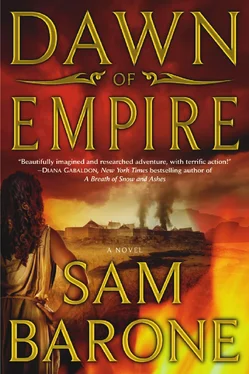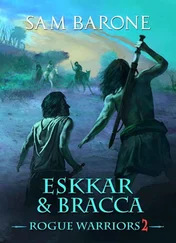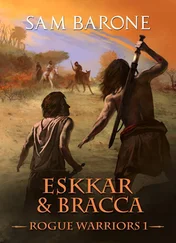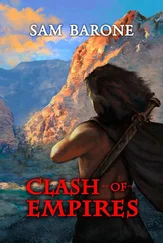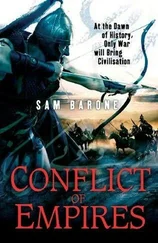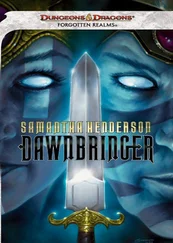Sam Barone - Dawn of Empire
Здесь есть возможность читать онлайн «Sam Barone - Dawn of Empire» весь текст электронной книги совершенно бесплатно (целиком полную версию без сокращений). В некоторых случаях можно слушать аудио, скачать через торрент в формате fb2 и присутствует краткое содержание. Жанр: Исторические приключения, на английском языке. Описание произведения, (предисловие) а так же отзывы посетителей доступны на портале библиотеки ЛибКат.
- Название:Dawn of Empire
- Автор:
- Жанр:
- Год:неизвестен
- ISBN:нет данных
- Рейтинг книги:4 / 5. Голосов: 1
-
Избранное:Добавить в избранное
- Отзывы:
-
Ваша оценка:
- 80
- 1
- 2
- 3
- 4
- 5
Dawn of Empire: краткое содержание, описание и аннотация
Предлагаем к чтению аннотацию, описание, краткое содержание или предисловие (зависит от того, что написал сам автор книги «Dawn of Empire»). Если вы не нашли необходимую информацию о книге — напишите в комментариях, мы постараемся отыскать её.
Dawn of Empire — читать онлайн бесплатно полную книгу (весь текст) целиком
Ниже представлен текст книги, разбитый по страницам. Система сохранения места последней прочитанной страницы, позволяет с удобством читать онлайн бесплатно книгу «Dawn of Empire», без необходимости каждый раз заново искать на чём Вы остановились. Поставьте закладку, и сможете в любой момент перейти на страницу, на которой закончили чтение.
Интервал:
Закладка:
The steppes people always had two or three groups of raiders oper-ating around the tribe’s center, looking for opportunities to take horses, tools, weapons, or women, and not necessarily in that order, although none would pass up a good horse to waste time on a woman. A village this size would attract them as it attracted everyone. There might even be almost as many people here as in the migrating tribe. Strange he hadn’t thought of that before.
Esk kar drained his water cup. The sharp pain behind his eyes had lessened, replaced by a dull throb. Nicar’s earlier words came back to him, and now they seemed to contain a challenge. “You want to understand why we must run, Nicar, is that it? It’s because we don’t have warriors. We have farmers, tradesmen, and a few dozen men trained to fight. The Alur Meriki can send hundreds of warriors against us. Even soldiers won’t fight against those odds.”
“If we fight them from behind our palisade…”
“The palisade will not stand. A few ropes over the top and they’ll pull it down.”
“Then we need a stronger barrier,” Nicar said, a little more forcefully.
“Could such a barrier be constructed in time?”
Esk kar glanced out over the balcony. The fence that surrounded Orak stood almost directly below him, only a dozen paces away, and he studied it as if seeing it for the first time. Not high enough, not strong enough, he knew. Orak needed a solid wall. A mud wall, if it could be built high enough and strong enough, might give the barbarians pause. But even a wall wouldn’t stop fighting men. Well, one thing at a time. They just needed something with enough resistance to make the attackers move on to easier pickings.
“I need to think about this, Nicar. What you ask may not be possible.
Give me some time. I’ll come back to you by sundown and tell you what I think.”
Nicar nodded, almost as if expecting the delay. “Come for dinner, then, after sundown. We’ll talk again.”
Esk kar bowed and left the house. He walked through the twisted lanes back to the soldiers’ compound, thinking about Nicar’s words. At the barracks he ignored the idle men standing around and went instead to the stables. He called for a horse and while the stable boys readied it, Esk kar crossed back into the lane. He approached the nearest street vendor and spent the last of his copper coins to buy some bread and cheese.
Shoving the food into his pouch, Esk kar filled a bag with water, then mounted up and rode slowly through the village. He passed through the main gate and nodded to the guard who looked at him nervously, no doubt wondering whether he’d be returning. Rumors must be spreading, fanned by the news of Ariamus’s sudden departure.
The fresh air cleared the last effects of the wine from his mind, and Esk kar gave his full attention to the spirited horse, which seemed equally glad to escape the village’s confines. He put the beast to an easy canter until he reached the top of a small hill about two miles east of the village.
From this vantage, he had an excellent view of both Orak and the river Tigris that looped behind it.
He reined in the horse and began eating the good bread and poor cheese he’d purchased, letting many different thoughts drift through his head. To his surprise, he had several ideas of what could and could not be done. Licking the last of the cheese from his fingers, he studied the village, almost as if seeing it for the first time.
Orak sat on a broad slab of hard earth and stone that forced the river to bend around it, so that the fast — flowing currents protected almost half the village from direct approach. The bedrock supporting the village had once been surrounded by marshland. As the settlement had grown, farmers had drained the marshes, growing crops and building huts on the recovered land. Dozens of canals, large and small, crisscrossed the countryside around the village, bringing water from the river to the farms.
Perhaps the land could be flooded again, leaving only one main approach to the village’s gates. In his mind’s eye, Esk kar pictured a line of archers atop a wall, standing shoulder to shoulder, launching flights of arrows into a swarm of mounted attackers beneath them. The bow, he decided. Only that weapon could make the soft dirt — eaters equal to Alur Meriki warriors, and then only if the bowmen had a wall to hide behind.
Faced with a strong wall, most of the mounted warrior’s advantages disappeared. No storm of arrows to devastate the defenders, who could then be overwhelmed and cut apart by the charging riders. Against such a wall, the Alur Meriki’s greater physical strength and skill with sword and lance would be lessened. Yes, it might work. If Orak could build the wall, the village might have a chance. Whether Orak could transform itself remained to be seen.
Orak resembled every other village Esk kar had seen. Small huts built from river mud and straw accounted for most of the dwellings, though the homes of the rich merchants and nobles tended to be much larger or two — story affairs. A fence surrounded the village, but numerous huts and tents had sprung up outside the stockade, including some that, against Nicar’s orders, butted up against the structure.
As for the villagers, they, too, were much the same as people everywhere. Most had few possessions: a cotton tunic, a wooden food bowl, perhaps a few crude tools. But the farms around Orak yielded plenty of grain, which the bakers turned into a hearty bread, the one clean smell that constantly scented the village air.
The farmers produced enough not only to feed themselves and their families, but enough extra to trade or sell in the village. That surplus filled Orak with people who didn’t need to farm to survive, merchants, traders, carpenters, shopkeepers, innkeepers, smiths, and dozens of other tradesmen. These skilled laborers provided any craft required to support the village, the river traffic, and the surrounding farms, taking payment in grain as well as the coins hammered out by the wealthy traders and nobles.
Only its size made Orak different from any other place Esk kar had visited. The village had been large when he arrived, and since then it had nearly doubled. In his travels Esk kar had learned that the larger the village, the easier he would be accepted. A big village always needed men to defend it, so a skilled fi ghting man who knew horses could usually fi nd employment and a safe place to sleep at night, even if the villagers might laugh behind his back at his barbarian heritage. They seldom laughed to his face; the battle scars on his body intimidated most villagers. At least they didn’t drive him away in their fear, something that had occurred more than once in his wanderings.
Those wanderings had taken him as far as the great sea to the south.
Three years ago, Esk kar decided to return to the land of his youth. He’d thrown in with a trader’s caravan destined for Orak, one of half a dozen guards hired to safeguard the merchant’s goods. When twenty bandits attacked the caravan at night, the outnumbered guards, caught by surprise, had been overwhelmed. Wounded, Esk kar and a few servants had escaped, reaching Orak a week later. The servants he’d rescued had not only vouch-safed him, but they stood by him until he recovered. Deciding to stay for a few months, Esk kar joined the force that guarded the village as a common soldier, and never got around to leaving. Since then he managed to work his way up to third in command, riding most of the patrols and chasing after runaway slaves or petty thieves.
Putting thoughts of the past aside, he decided to look at Orak as the Alur Meriki would. Taking a gulp from the water bag, Esk kar rode down the hill and headed toward the river.
The breeze refreshed him, the air cool and invigorating. Esk kar often longed for the feel of the wind in his face. The feel of a horse on the open lands always called to him, sometimes making each day spent in the village’s confines seem a day of torment. You’ll always be a barbarian, even though your own people cast you out. For years he had drifted aimlessly across the lands, scorned by the villagers and farmers he encountered, even beaten and abused.
Читать дальшеИнтервал:
Закладка:
Похожие книги на «Dawn of Empire»
Представляем Вашему вниманию похожие книги на «Dawn of Empire» списком для выбора. Мы отобрали схожую по названию и смыслу литературу в надежде предоставить читателям больше вариантов отыскать новые, интересные, ещё непрочитанные произведения.
Обсуждение, отзывы о книге «Dawn of Empire» и просто собственные мнения читателей. Оставьте ваши комментарии, напишите, что Вы думаете о произведении, его смысле или главных героях. Укажите что конкретно понравилось, а что нет, и почему Вы так считаете.
